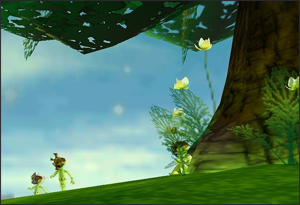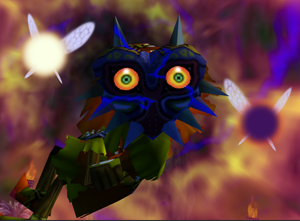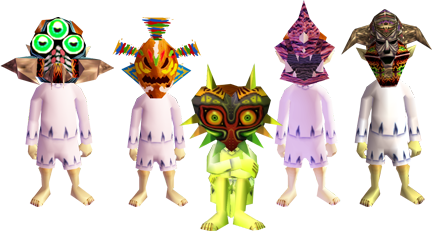Majora’s Mask: The Psychology of the Moon Children
Posted on August 12 2011 by Legacy Staff
 Majora’s Mask is an experience which attempts to go the distance in establishing an elaborate back-story or otherwise provides details which may elude all but the most hardcore and dedicated fans of the series. Case in point: the Moon Children. These mysterious entities are found only inside of the ominous moon which threatens to destroy the world of Termina. Much like the Mask of Majora which has possessed the Skull Kid, much mystery surrounds the seemingly harmless children within the Moon. I believe that these Moon Children are representative of the Skull Kid’s personality; they exist as distinct aspects of a single entity; as such, they will be analyzed and broken down in the paragraphs that follow.
Majora’s Mask is an experience which attempts to go the distance in establishing an elaborate back-story or otherwise provides details which may elude all but the most hardcore and dedicated fans of the series. Case in point: the Moon Children. These mysterious entities are found only inside of the ominous moon which threatens to destroy the world of Termina. Much like the Mask of Majora which has possessed the Skull Kid, much mystery surrounds the seemingly harmless children within the Moon. I believe that these Moon Children are representative of the Skull Kid’s personality; they exist as distinct aspects of a single entity; as such, they will be analyzed and broken down in the paragraphs that follow.
For example, their child-like and playful demeanor can be attributed solely to the Skull Kid’s personality, independent of the dark and malevolent influence of Majora’s Mask. The Skull Kid was said by Tatl to be a playful and mischievous creature; their playing in the field following the storm is evidence of this. The power of Majora’s Mask, in tandem with the Skull Kid’s personality, allowed the Skull Kid’s troubled mind to manifest in the children of the moon. This permeation of the Skull Kid’s personality can be evidenced in multiple instances. Two particular ones come to mind. First, right at the beginning of the game, when the Skull Kid knocks Link off Epona, the Skull Kid can be seen raising his Mask so that he can assess the situation; secondly, when Link chases after and confronts the Skull Kid prior to turning into a Deku Scrub, the Skull Kid states that he “just thought [he’d] have a little fun with you…” Boasting, “Do you really think you can beat me as I am now?” That would undoubtedly be the Skull Kid speaking through the power of Majora’s Mask; the spirit within the Mask would most likely remain as powerful as it had ever been; thus, that statement could only be applied to the Skull Kid himself. This would mean the spirit of Majora and the Skull Kid would be working in concert with each other, lending credence to the theory that the power of Majora’s Mask could well result in such a manifestation of the Imp’s personality in the Moon Children. As such, the Moon Children’s care-free and spacey attitude are reflections of the Imp’s characteristics. This attitude is evident in some of their questions to Link after playing with him.
The child wearing Odolwa’s Mask, for instance, asks Link about friendship, inquiring “Your friends… What kind of… people are they? I wonder… Do these people… think of you… as a friend?” This hearkens back to Tatl’s recollection of their days alongside the Skull Kid before he got a hold of Majora’s Mask; the Skull Kid is said to have been friends with the Four Giants, who left him behind when he acquired Majora’s Mask. There’s also the Skull Kid’s drawing, which was drawn after he met Tatl and Tael in the midst of a torrential rain. In this recollection, the Skull Kid is huddled in a hollow log in an attempt to be sheltered from the storm outside; this is when he meets and befriends the two fairies, who console him and keep him company throughout the storm. Thereafter, the fairies are seen playing with the Skull Kid, where they paint the drawing of them together at the gate to the inner areas of the field.
 Next, we have the child wearing Ghot’s Mask, which asks of Link “What makes you happy? I wonder…what makes you happy…does it make…others happy, too?” This recalls the Happy Mask Salesman, who, coincidentally, believes that happiness can be spread to others through the use of masks. Specifically, he says of the masks Link has gathered “The masks you have are filled with happiness. This is truly a good happiness.” Incidentally, it is also the Moon Children who require masks of Link for some unknown purpose, perhaps to make up for whatever the Skull Kid fears that he lost in acquiring Majora’s Mask. In other words, it seems that the Skull Kid is trying to use masks in order to become happy after his falling out with the Giants and Fairies.
Next, we have the child wearing Ghot’s Mask, which asks of Link “What makes you happy? I wonder…what makes you happy…does it make…others happy, too?” This recalls the Happy Mask Salesman, who, coincidentally, believes that happiness can be spread to others through the use of masks. Specifically, he says of the masks Link has gathered “The masks you have are filled with happiness. This is truly a good happiness.” Incidentally, it is also the Moon Children who require masks of Link for some unknown purpose, perhaps to make up for whatever the Skull Kid fears that he lost in acquiring Majora’s Mask. In other words, it seems that the Skull Kid is trying to use masks in order to become happy after his falling out with the Giants and Fairies.
Following is the child wearing Gyorg’s Mask, who asks Link “The right thing…what is it? I wonder…if you do the right thing…does it make…everybody…happy?” This tells us that following the recent events coupled with his initial falling out, that the Skull Kid is himself unsure of what is right and wrong, his judgment having been clouded by a combination of the falling out and the dark powers of Majora’s Mask. Furthermore, the Child is wondering whether doing the right thing can make an individual happy, demonstrating a sense of conflict and possible wish or intent to make up for his mistakes. This desire for resolution is evidenced in the story told by Anju’s grandmother: “The childhood friend felt neglected, so he spread his anger across the four worlds. Repeatedly, he wronged all people.” The Skull Kid could very well have been acting as a small child would, throwing a fit of sorts in order to garner attention from those around him. He would have done this in a desperate attempt to regain the Four Giants’ friendship after they deserted him, this behavior being a result of the Imp’s twisted sense of right and wrong.
Next is the child wearing Twinmold’s Mask, who inquires “Your true face… What kind of… face is it? I wonder… The face under the mask… Is that… your true face?” This tells us a couple of things: either the child is attempting to hide himself under a mask because he is ashamed of his behavior and is trying to mask –no pun intended– his feelings of shame and loneliness; or, on the flip side, he may be attempting to mask his true intentions, as was the case with his run-in with the Great Fairy of Magic, who said of him “I thought that child was my friend, so I grew careless.”
Last but not least, we have the Child wearing Majora’s Mask. He in turn asks Link to show him “his true face” if he comes up to him wearing any masks at all; this tells us that the Skull kid wants transparency, he wants to be able to communicate with the world in an open and sincere fashion, but is unable to because of the shame and incidents of his past. This is why he wants Link to show his true face; he wants an attempt at transparency that he himself wasn’t able to give to others. When Link does come to him as himself though, he is asked if he would like to “play with [him]?“ the Child responds by saying “OK, let’s play good guys and bad guys… I’ll be the good guy, and you be the bad guy…” This tells us that the Child is wanting to play with Link because he is lonely, he has been deserted by his friends, and is thusly reduced to having to sit under a tree by himself as the other children play. It also accentuates an interesting notion, this Child also appears to hold a warped and twisted perspective on reality, perhaps believing that his actions against the denizens of Termina are justifiable. Conversely, it could also be an attempt at reconciliation, present here as in the other Children.
In summary, we have Odolwa, who is unsure of the nature of true friendship following the earlier fallout with the Giants. We then have Ghot, whose comments seem to insinuate a need for happiness and reconciliation. Thirdly, we have Gyorg, who is wishing to come to a point of reconciliation in reparation for the things he has done and the harm he has caused. Penultimately, there’s Twinmold, who wears a mask in an attempt at masking his own feelings of shame and loneliness, or his true nature as a mischievous individual. Last but not least, there’s Majora himself, whose loneliness comes through in a desire to play a game of cops and robbers with Link in making up for his desertion by the Four Giants. It is these examples which reveal to us the nature of the Moon Children as parts of a whole, fragmented representations of the Imp’s personality brought out by the power of Majora’s Mask.




